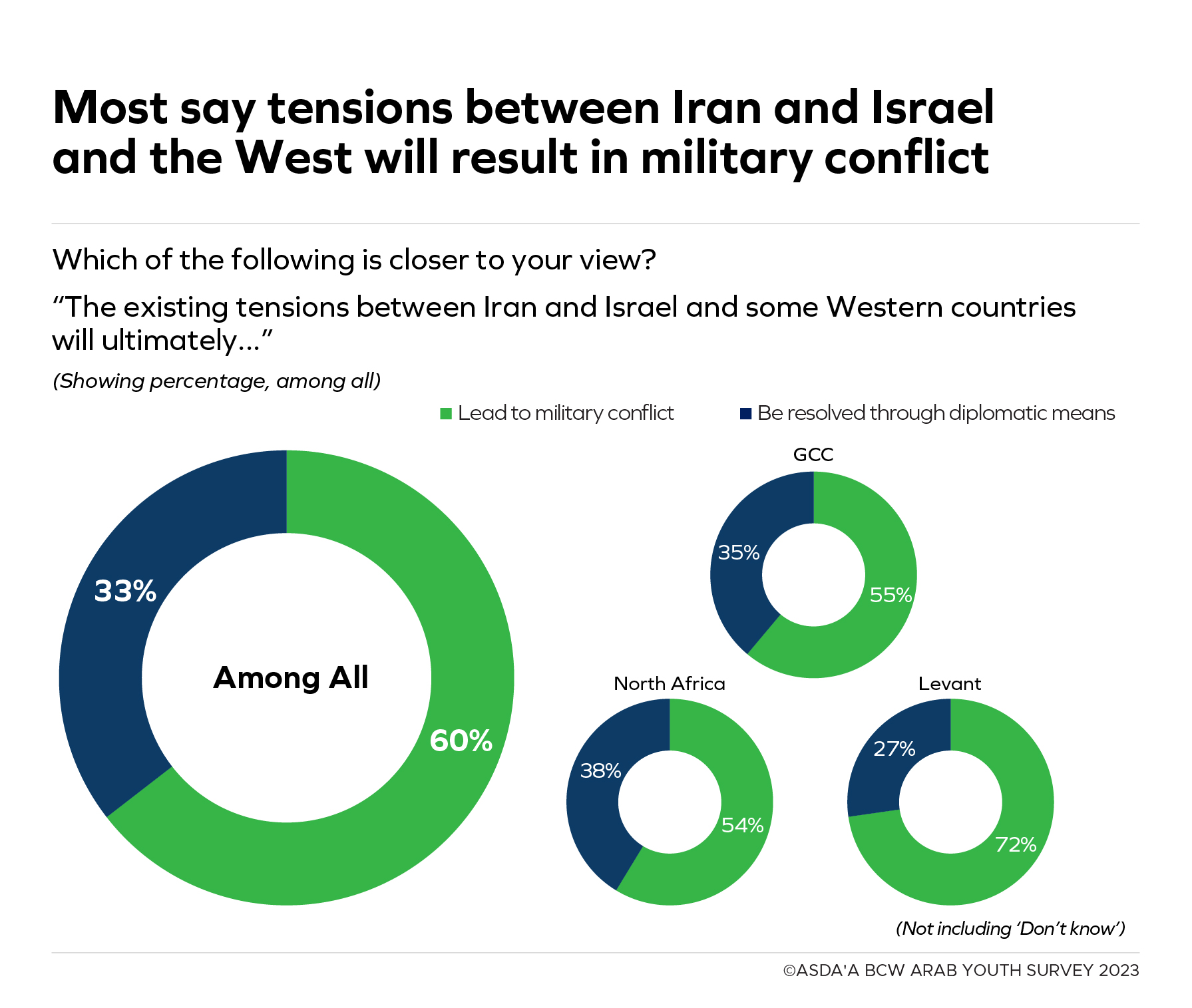- Two-thirds say the Palestinian-Israeli conflict will not be resolved soon, while only a third say the Arab world gives it the attention it deserves
- Most Arab youth oppose normalisation of ties with Israel but a majority in the UAE, Egypt and Morocco favour closer diplomatic relations
Around two-thirds (60%) of Arab youth say that relations between Iran and Israel and the West will deteriorate into military conflict. Many also say that they expect the Iranian regime to become even more authoritarian in the future, with a third saying the country will experience more civil unrest and possibly a coup.
These are some of the key insights from the landmark 15th annual ASDA’A BCW Arab Youth Survey, unveiled today by ASDA’A BCW, the Middle East & North Africa’s leading communications consultancy. The survey is the largest study of its kind of MENA’s largest demographic, its 200 million plus youth. This year’s findings show young Arab men and women ‘Living a New Reality’, the overarching theme of the 2023 survey.
ASDA’A BCW commissioned SixthFactor Consulting, a leading research company, to conduct face-to-face interviews with 3,600 Arab citizens aged 18 to 24 in their home nations from March 27 to April 12, 2023. The largest sample in the survey’s history was equally divided between men and women in 53 cities across a total of 18 Arab states, including for the first time South Sudan. The interviews were deliberately conducted face to face rather than online to maximise the accuracy of the research and to reflect the nuances of Arab youth opinion across the region as much as possible.
The 75-year Palestinian-Israeli conflict won’t be resolved soon
Arab youth are also pessimistic about the prospects for peace in the Palestinian Territories, with most (55%) saying the 75-year conflict between Palestinians and Israelis won’t be resolved within the next five years.
Although a majority (60%) of GCC citizens said a positive resolution is ‘likely’, over two-thirds (69%) in Levant, and more than half (57%) in North Africa, say it is ‘very unlikely’ or ‘somewhat unlikely’ that the conflict will be resolved soon.
Moreover, nearly four in 10 (39%) young Arabs overall believe that with rising national priorities, the conflict does not receive adequate attention from the Arab world, rising to more than half (51%) in the Levant region, which includes the Palestinian Territories.
A divergence of views on closer ties with Israel
Most Arab youth oppose the normalisation of ties between Arab countries and Israel but a majority in the United Arab Emirates, Egypt and Morocco favour closer diplomatic relations with the country.
When young Arabs were asked whether they supported or would endorse their government’s decision to normalise diplomatic ties with Israel, three-quarters (75%) in the UAE, a signatory of the Abraham Accords, said they supported normalisation. A third in Bahrain, the first country to sign the agreement, said the same.
In Egypt, nearly three-fourths (73%) support diplomatic ties with Israel, as do nearly half of youth in Morocco, another participant in the Abraham Accords. In Sudan, however, the fourth Arab nation to establish full diplomatic ties with Israel, 94% oppose it.
In South Sudan, 47% of youth favour closer relations with Israel, compared with 31% in Algeria, 19% in Syria and Yemen, 13% in Tunisia, 14% in Kuwait, and just 6% in Jordan. In the rest of the region surveyed, an overwhelming majority oppose diplomatic ties.
Sunil John, President, MENA, BCW and Founder of ASDA’A BCW, said that while the agency’s 15th annual attitudinal survey of Arab youth showed an intriguing divergence of opinion on relations with Israel in some of the countries that have joined the Abraham Accords, the underlying sentiment across the region was that rapprochement with Israel should remain off the table.
“Overall, the Arab world has witnessed a reduction in armed conflict in recent years, with the situation in Iraq, Syria, Libya and Yemen calmer than it was before,” said John. “The exceptions of course are Sudan, where civil unrest has flared recently, and the Palestinian Territories, where relations between Palestinians and Israelis remain deadlocked, a state of affairs exacerbated by the involvement of Iran.”
“These conflicts notwithstanding, the overall de-escalation of tensions suggests that countries in the Middle East are willing to overcome their differences,” John added. “This trend must continue if the region, an economic bloc of over 400 million people, is to realise its full potential.”
To know more about the findings, log on to arabyouthsurvey.com
-ENDS-













